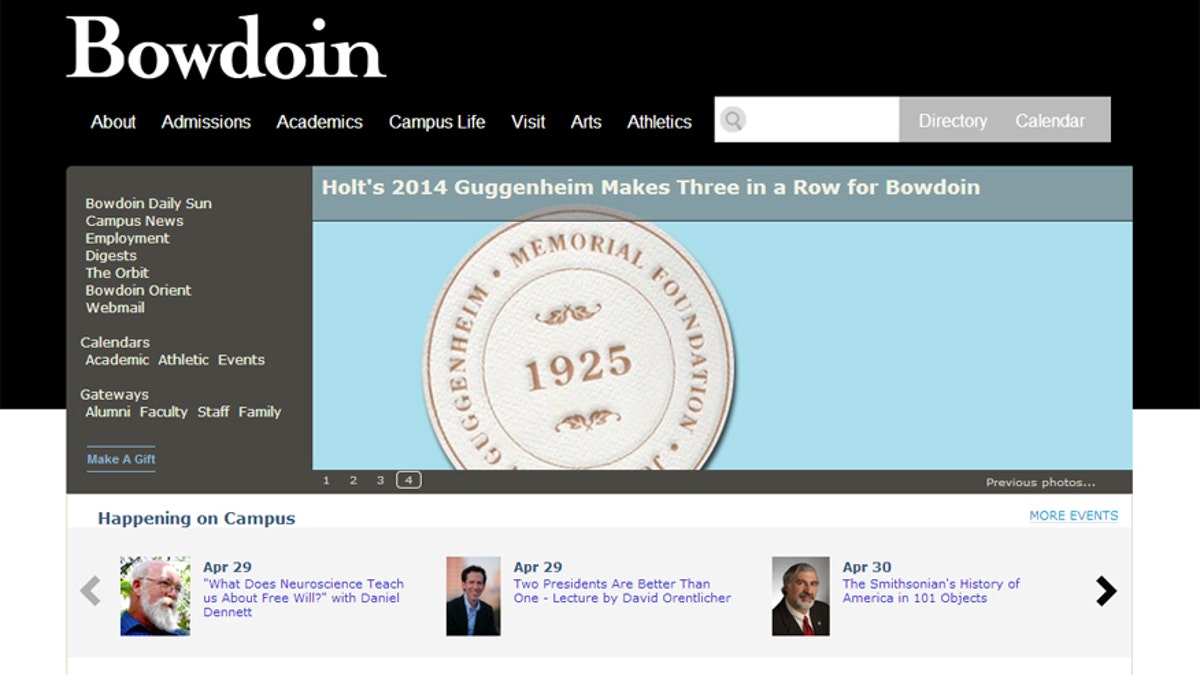
A screenshot of the Bowdoin College website. (Bowdoin)
What is the least free place in the United States? Prisons, certainly, but even prisoners enjoy the freedoms of mind and spirit. The least free place for the freedoms of thought, expression and faith is most likely the college campus. Colleges have become pressure cookers of conformity.
Of course, colleges don’t see themselves that way. They proclaim their commitment to academic freedom and to tolerance of differing views. But when these declarations are put to the test, they often dissolve.
Recently, the president of Brandeis University canceled an honorary degree that was to be awarded to Ayaan Hirsi Ali, the Somali-born former Muslim who has emerged as a leading secular critic of Islam. The cancellation resulted from a campaign begun by a Muslim student who smeared Hirsi Ali as a purveyor of “hate speech.”
[pullquote]
Last fall the lead story was the shouting down of New York City Police Commissioner Raymond Kelly when he arrived at Brown University to give a speech. The Brown administration, forewarned of the plan to silence Kelly, stood by and did nothing.
Cases like this create headlines, but they only hint at the deeper problem. In an effort to get a fuller picture, my organization, the National Association of Scholars, spent two years examining Bowdoin College, a small college in Maine, from top to bottom. We issued our findings in a 400-page study, "What Does Bowdoin Teach? How a Contemporary Liberal Arts College Shapes Students."
What we found is that Bowdoin teaches conformity.
Of course, Bowdoin doesn’t say that. It tells its students that it celebrates diversity and offers an education that is rich with opportunities for students to become “citizens of the world.”
Buyer beware.
Bowdoin recently had its own Brandeis-like moment when it found a pretext to terminate Robert and Sim Gregory, a husband and wife who had served for nearly a decade as advisers to the campus InterVarsity Christian Fellowship.
The Gregorys are evangelical Christians who had gone about their work quietly. There were no student complaints. But Bowdoin was apprehensive that they might at some point discriminate against gays and decided to force the issue by presenting them with an “agreement” that would have precluded their teaching the orthodox Christian view of marriage as “One man and one woman in a life-long committed union.”
The Gregorys asked for assurance that if they presented this view to their students in a “serious study of the Bible,” Bowdoin would not charge them with “discrimination or harassment or both.”
Bowdoin declined to give this assurance. The Gregorys also asked for a “Reservation of Rights to Religious Beliefs and Practices” that would have explicitly allowed them to continue their religious teaching.
Bowdoin said “no.”
At Bowdoin, as at Brandeis, some religious views are welcome and the rest are “hate speech.”
Students who express traditional religious views are particularly vulnerable to this treatment.
In our study we encountered a traditional Catholic who said, “When abortion is brought up, I have to just keep my mouth shut.” We also spoke at length to a young alumna who recounted years of bullying by other students who taunted her and her fiancé for their Christian views.
Ayaan Hirsi Ali is an atheist; the Gregorys are Christians; but another big story in American higher education earlier this year was the effort by the American Studies Association to orchestrate an academic boycott of Israel. The furor that followed showed the considerable degree to which anti-Semitism has also found a favored place on many campuses.
The latest variation on the theme of liberal education’s hostility to freedom of thought is the decision of Azusa Pacific, a evangelical Christian university, to “postpone” a long-scheduled lecture by Charles Murray, who was going to speak about his book, "The Curmudgeon’s Guide to Getting Ahead." It isn’t Murray’s current writing that riled the Azusa Pacific’s administration but his reputation as the co-author twenty years ago of "The Bell Curve," which included data on the correlations of race and IQ.
Jon Wallace, the president of Azusa, we’re told, acted out of fear of “hurting our faculty and students of color.” Murray promptly posted a reply that should haunt President Wallace for the rest of his days.
The biases in these cases have a common source. Colleges today have become champions of progressive enlightenment, which isn’t quite the same as yesteryear’s “political correctness.”
A phrase that crystallizes this new attitude is, “Error has no rights,” which is a recipe for coming down hard on anyone who disagrees. It is applied ruthlessly on every issue, from gay marriage to climate change.
At Bowdoin this attitude is fostered by the faculty and administration and pervades student life.
Traditional liberal openness is gone; so is a live-and-let-live tolerance. In their place, aggressively enforced conformity has emerged.
“Shut up” is the new “veritas.”
